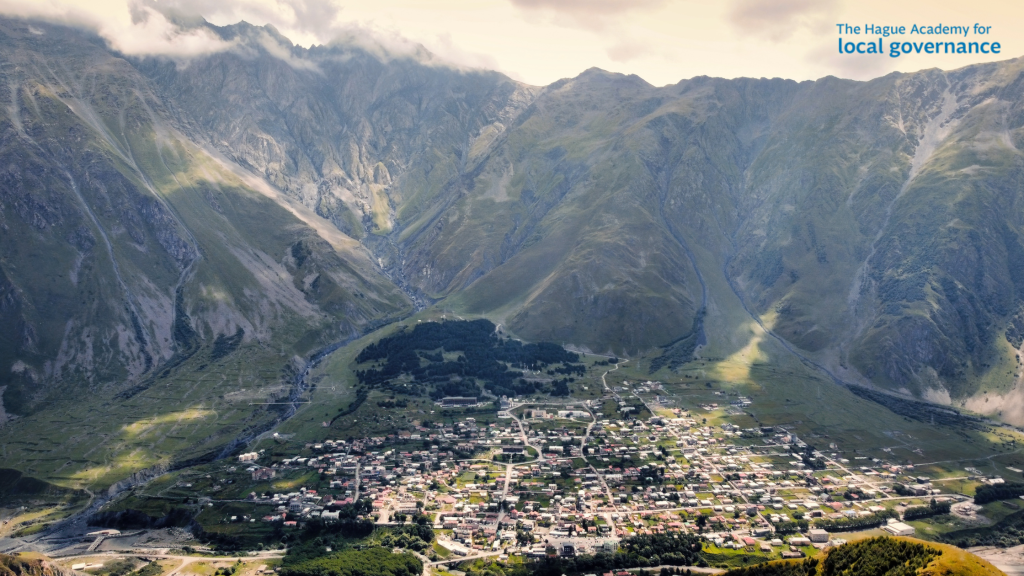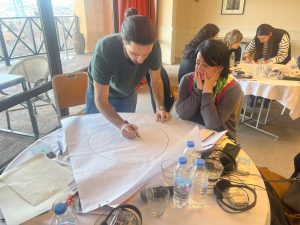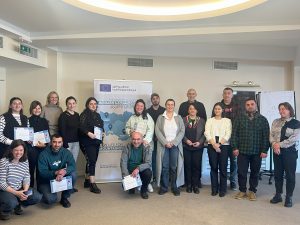Co-creating opportunities: Capacity building and knowledge transfer are key to participatory rural economic development in Georgia. By sharing proven practices and strengthening the capacity of local actors, disadvantaged communities can co-create solutions that promote inclusive and sustainable economic development.

The mountainous region of Georgia is defined by its breathtaking landscape. However, the remote and rugged terrain poses significant economic challenges for its inhabitants. Young people often leave their remote towns and villages for urban centres in search of better opportunities, leaving aging communities with limited economic prospects. The region of Racha-Lechkhumi and Kvemo Svaneti is one of the most economically disadvantaged in Georgia, with unemployment rates as high as 30%.
In response, the “New Life for Mountainous Georgia” project, led by Georgian NGO Innovation Reforms Center (IRC), seeks to foster rural economic development through a participatory and localized approach. At its core is the establishment of Local Action Groups (LAGs) inspired by the European LEADER model, which emphasizes local engagement, innovation, and collaboration.
Definition: Local Action Groups (LAGs)
Local Action Groups (LAGs) are collaborative entities that bring together representatives from civil society, local businesses, and municipal governance to tackle the unique challenges of rural regions. By promoting a participatory and bottom-up approach, the “New Life for Mountainous Georgia” project empowers LAGs to lead community-driven development initiatives.
Best practices for participatory rural economic development
LAGs provide a framework for addressing the specific challenges of Georgia’s mountainous regions, such as depopulation, limited infrastructure, and economic stagnation. These groups enable communities to take ownership of their development by bringing together multiple stakeholders to co-creating solutions, such as promoting eco-tourism and implementing smart village concepts.
The Hague Academy supports the project with a series of workshops, such as a workshop on youth engagement in rural development and an experience exchange workshop. The latter brought together LAG members from Georgia and their counterparts from Austria, Sweden, and Slovenia. Looking back on decades of successful Local Action Groups, representing experts from these countries shared valuable lessons with Georgian members on fostering regional partnerships, youth engagement and intergenerational dialogue, and regional branding.
A Case Study: Marking the Ghorjomi-Leknari-Bakhmaro Hiking Trail
One example of how LAGs can drive rural innovation is the EU-supported marking of the Ghorjomi-Leknari-Bakhmaro hiking trail in Khulo municipality. Spanning 30.8 kilometers, the trail connects destinations such as cascading waterfalls, the Ghorjomi mosque, and the Bakhmaro resort.
By creating new tourist attractions and infrastructure, the initiative aligns with the broader goals of diversifying rural economies and reducing poverty. This approach showcases how localised development strategies can address challenges like economic stagnation while fostering sustainable tourism practices.
Read more about best practices for local economic development here.
The Road Ahead
As the “New Life for Mountainous Georgia” project progresses, its comprehensive approach to rural economic development continues to evolve. With activities planned through 2025, including further workshops, grant competitions, and the continued implementation of local development strategies through LAGs, the project aims to leave a lasting impact.
To learn more about local economic development strategies and setting up participatory local economic development initiatives, see our upcoming course on Local Economic Development.
Related courses
We offer a diversity of courses throughout the year. Here are several other courses you might like.

